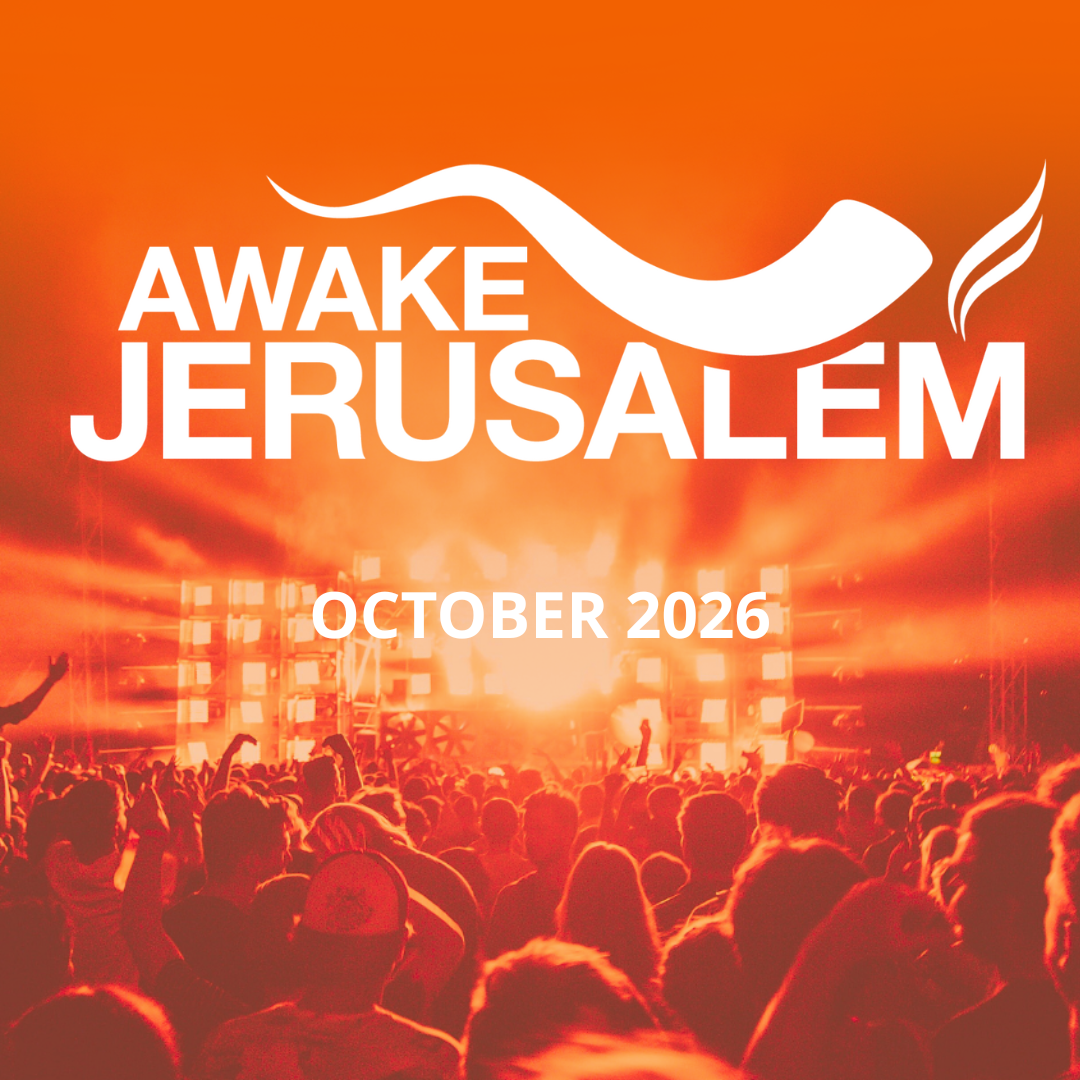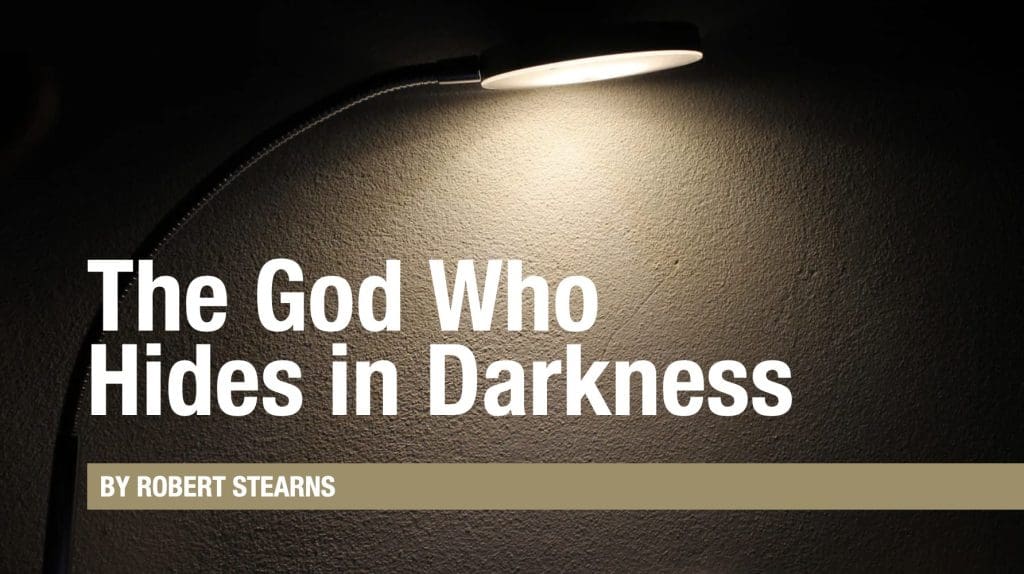Are you afraid of the dark?
When my sons were much younger, I became well aware of the need to turn on the night light before sending them to bed, to help dispel their fears.
But I am referring here to a different and much more substantial fear of the dark.
Scripture says of God, “Clouds and thick darkness surround Him” (Psalm 97:2) – not how we normally picture our Heavenly Father. Yet anyone who has walked with the Lord for any length of time will admit that there are seasons when the presence of God is obscured from even the most spiritually perceptive.
Instead of shying away from that truth in fear or dread, we must sooner or later confront the reality of a God whom we can’t always see.
We have just completed the season of Purim on the biblical calendar, when we remember how God delivered the Jewish people through the courage of Esther. The story of Esther is the perfect example of God’s ‘hidden’ presence in the midst of darkness.
In our recent podcast, Rabbi Erez Sherman and I discussed some remarkable stories and insights associated with Purim, demonstrating the resilience of the Jewish people in carrying the presence of God even in the darkest of times. As you listen, I know it will be a great strength and encouragement to you!
I believe that times of momentary instability and confusion are the equivalent of God asking us to believe Him when we don’t understand. The darkness is an invitation to walk by faith – to trust God’s vision, not our own. And if we embrace God in the darkness, like Esther we will discover the true purpose the darkness is meant to play in our lives.
Night Light
We tend not to like the dark. We frequently complain when we feel we are in the wilderness of a night season, as the Psalmist does in chapter 139 verses 11 and 12:
“If I say, ‘Surely the darkness will overwhelm me, and the light around me will be night,’ even the darkness is not dark to You, and the night is as bright as the day, darkness and light are alike to You.”
God is total, complete, perfect light. He IS light (1 John 1:5). So, when you are light, apparently no darkness is dark to you. If darkness and light are alike to God, then there must be a reason outside Himself that He would opt for one over the other. We can hereby deduce that when God chooses to drape Himself in darkness, it is not for His benefit, but for ours.
But what purpose could these seasons of spiritual darkness hold for our lives? What good thing could something so antithetical to the nature of God be producing? Allow me to offer the following illustration in answer to that:
Think of the experience of seeing someone in a fully-lit room – the light reflecting off them as it is everything else. The person is lit just as the wall behind them, the floor beneath them, the table beside them.
Now, imagine you are in a space of total darkness and, suddenly, you begin to see something. The conditions around you haven’t changed; it is still completely dark. But the more you stare, the more you can tell there is a light inside this person that is radiating outward, enabling you to see them. They are not lit from without, they are lit from within.
In 2 Corinthians 4:6, Paul reminds us, “For it is the God who commanded light to shine out of darkness, who has shone in our hearts to give the light of the knowledge of the glory of God in the face of Jesus Christ.” He goes on to describe the hardships that this involves, concluding that the ultimate goal is, “…that the life of Jesus also may be manifested in our mortal flesh” (v. 11).
Could it be that without the darkness of bewilderment, distress, and gloom, we would not be compelled to manifest the inner transformation that the blood of Jesus has wrought inside of us? Could it be that, for those with eyes of faith, darkness is simply an opportunity to shine? Indeed, darkness is the backdrop on which the display of our lives is made manifest.
The Merriam-Webster online dictionary says the verb “manifest” means “to make evident or certain by showing or displaying”, and defines the adjectival form as, “readily perceived by the senses and especially by the sight”.
I believe God dims the lights at certain moments in which He wants the attention to be on Him. Just when He is ready to move, God wants it quiet – He wants it dark. And since God doesn’t move except through His people, that darkness is our entrance cue.
This has always been the case. The Israelites in the wilderness were afraid to approach the storming, smoking mountain in which God dwelt, but Moses chose to enter the dark place of God (Exodus 20). Here, he found fellowship with his Maker that transformed his very being. Later, we learn that upon returning from the mountain, the face of Moses shone with the glory of God (Exodus 34).
I would like to present you with another scriptural example of one who found her moment of opportunity in a season of darkness to display the kind of courage that is still spoken of today.
Star Bright
Few stories are as compelling to me as that of Esther – the Jewish orphan who became a Persian queen. A central theme in the story of Esther is that of concealment and its contrast, exposure. The Hebrew name Esther shares the same root as the Hebrew word for conceal.
God, too, is hidden in this legendary account. The name of God is not even mentioned in the book of Esther – the only book in Scripture for which this is true. It is thought by some that the absence of God’s name from this book is meant to show how forgotten He was by His people during the Babylonian exile.
Living in a pagan land without the demonstrable presence of her God, we can infer that Esther’s spiritual life was one of thick darkness. But out of this night season, the presence of a most bright and brilliant star makes its appearance in the blackened sky.
As the main character in the story of Purim, Esther is an orphan girl living in exile. I don’t know that you could get much closer to a polar opposite of the almighty, all-powerful, omniscient God of the universe. The fabric of the story itself is also a stark contrast.
Instead of God sending plagues, as He did upon Egypt, Esther had to use what was hers (favor with the king) in order to save her people. Not only that, but it was her own willpower that led her to make this choice! We remember her famous line, “…I will go in to the king…and if I perish, I perish” (Esther 4:16b).
Esther seems to be the heroine orchestrating her own story. Not only is the actual voice of God absent from the book of Esther, but also when her trusted advisor, Mordecai, comes to her pointing out that this is undoubtedly the reason she has come to royalty and that now is her moment to reveal her true identity, not even he tells her what to do! Esther has to strategize herself and execute her own plan – right down to the choice of table linens.
I shared earlier that the root of Esther’s name stands for concealment. Esther was concealed in many ways – seemingly from the eyes of God and, certainly, her true identity as a Jewess was concealed from the eyes of her Persian contemporaries. How fitting then, that the Persian meaning for the name Esther is star. This reminds us that seasons of darkness are intrinsically linked with the unmistakable, undeniable, and wholly unconcealable manifestation of light.
Time to Shine
I believe we are in a night season not unlike the one Esther found herself in. The presence of God is muted, or at best distorted, in many sectors of society and even within the organized Church. The sinister powers conspiring against God’s chosen people are even more formidable than they were when Haman etched his plot to annihilate the Jews centuries ago. And in the midst of it all, what is our response? What is the demonstration that will come forth from the people of God? Are we expecting God to part the Red Sea while we pass through on dry ground? Do we expect Him to do it for us?
Jesus tells His disciples they are “the light of the world”, and that they must not be hidden, but displayed, so that they give light for all to see (Matthew 5:14). He goes on to say, “Let your light so shine before men, that they may see your good works and glorify your Father in heaven,” (v. 16).
Yes, God is sovereign, and we can do nothing apart from His Spirit – but Beloved, it’s our light He is wanting to shine. God doesn’t want to do it for us (He already did that!) He wants to do it through us. And, if the Church will not rise to the occasion, God will raise up another voice of deliverance with the courage to stand and win back a generation the enemy has stolen. But did it ever occur to you that maybe, just maybe, He desires to manifest His glorious, perfect, matchless plan through your life? That maybe you are the Esther this world is waiting for?
Our eternal destiny is also our present mandate: “And there will no longer be any night; and they will not have need of the light of a lamp nor the light of the sun, because the Lord God will illumine them; and they will reign forever and ever” (Revelation 22:5).
————
Want to learn more? The Bishop and The Rabbi is a dynamic and informative weekly podcast, hosted by Bishop Robert Stearns and featuring different guest Rabbis from the Jewish community. It presents discussions on topics like the content of this article, the Hebrew Scriptures from Jewish and Christian viewpoints, current events in America and the Middle East, and the future of Jewish-Christian cooperation. Tune in now to the latest episodes by clicking here!





